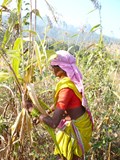
The Food and Agriculture Organization (FAO) of the United Nations and the European Union (EU) have initiated a significant four-year programme, valued at 47 million euro, aimed at enhancing the resilience of pastoral communities in Eastern Africa. The initiative, known as the "Pastoralism and Livestock Adaptation to Climate Change in Eastern Africa Programme" (PLACE), seeks to develop sustainable and climate-resilient pastoral systems that address the multifaceted challenges posed by climate change.
Rein Paulsen, FAO’s Director of the Office of Emergencies and Resilience, emphasized the importance of the EU's long-term partnership in the region, particularly in fortifying the resilience of pastoral livelihoods. He stated, “We welcome this timely programme as the region's rangelands face increased incidence and severity of climate-related shocks and a gradual degradation of the natural resource base, which is further threatening the pastoral way of life.”
Livestock plays a crucial role in the lives of over 250 million people in Eastern Africa, deeply integrated into the social, cultural, and spiritual fabric of communities. For pastoralists, livestock keeping is not only a commercial activity but also a social investment, providing numerous ecosystem services that are challenging to quantify economically. These intangible benefits encompass a wide range of cultural and environmental advantages.
However, pastoralism in Eastern Africa is at a crossroads. Societal changes have led to a decline in interest among young people in pursuing traditional pastoral lifestyles. Additionally, frequent and severe droughts have devastated rangelands, causing the loss of over 13 million livestock between late 2020 and early 2024.
The PLACE programme adopts a comprehensive approach to fostering resilience, improving food security, and establishing sustainable livelihoods. It will be implemented across four cross-border cluster areas: the Bahr el-Arab, Karamoja, Mandera, and Mara-Serengeti Clusters, covering regions in Ethiopia, Kenya, Somalia, South Sudan, Sudan, Tanzania, and Uganda.
The initiative focuses on several critical areas, including strengthening land tenure systems, reducing greenhouse gas emissions, preserving biodiversity, and building robust local economies within the livestock sector. Reducing resource-based conflicts, and creating job opportunities, PLACE aims to enhance living conditions, ensure fairness and inclusivity, and amplify the voices and participation of pastoralists, with particular attention to gender and youth inclusion by promoting sustainable economic growth.
PLACE is expected to directly benefit more than 100,000 households, making a substantial impact on the livelihoods and resilience of pastoral communities in Eastern Africa. Through its holistic approach, the programme seeks to create a sustainable and prosperous future for pastoralists in the region.
















